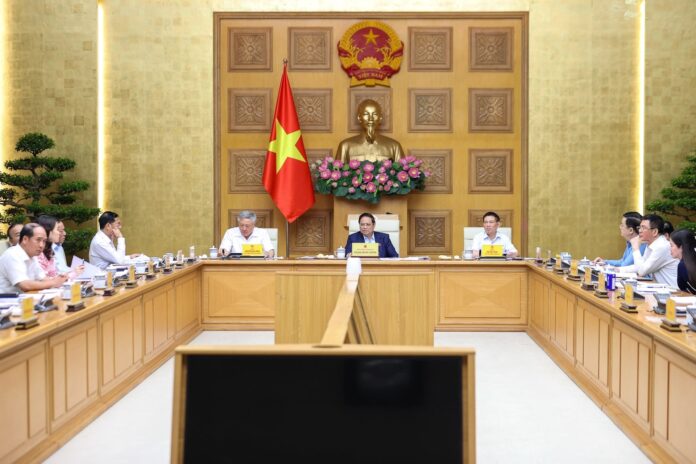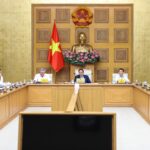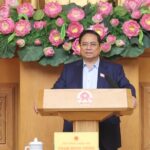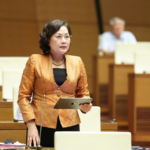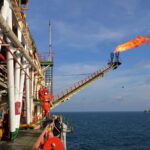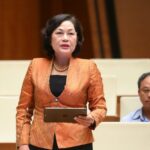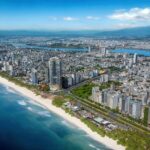On June 23rd, Prime Minister Pham Minh Chinh chaired a meeting with the government’s regular members to assess the situation and devise flexible, timely, and effective solutions regarding the escalating conflict in the Middle East and recent global developments.
The attendees of the meeting acknowledged the direct impact of heightened tensions in the Middle East on the global economy and various other aspects. Consequently, oil and energy prices have surged, affecting global trade and transportation, and raising the specter of inflation. Vietnam’s economy has also been affected, particularly in terms of transportation and import-export activities. The consequences may include challenges related to growth, pricing, exchange rates, capital flow, freight rates, logistics, supply chain disruptions, production, and business operations, along with potential consumption contractions in several countries, including some of Vietnam’s significant markets and trading partners.
Emphasizing the importance of timely assessment and response, the Prime Minister highlighted the need to identify tasks and implement solutions with agility and effectiveness. While acknowledging the difficulties and challenges, he also pointed out the opportunities to accelerate the green and sustainable economic restructuring process. This situation presents a chance to diversify markets, products, and supply chains, as well as to further harness the spirit of enterprise and the collective efforts of the entire political system in line with the prevailing circumstances.
Notably, to maintain the economy’s critical balances, especially energy security, the Prime Minister instructed the Vietnam National Oil and Gas Group (Petrovietnam) to increase oil and gas reserves and efficiently operate refineries. He also directed the Vietnam Oil and Gas Group (Petrolimex) and Petrovietnam to ensure a stable supply of gasoline, preventing any disruptions or price gouging.
Additionally, the Prime Minister ordered the Vietnam Electricity Group (EVN) to guarantee uninterrupted power supply for production, business, and consumption, with new power and transmission projects slated for completion by August 19th. He also instructed the General Corporations of Food to manage food reserves, regulate supply and demand, and intervene in the market by buying and selling to stabilize prices.
A multitude of strategies are proposed to tackle the emerging challenges
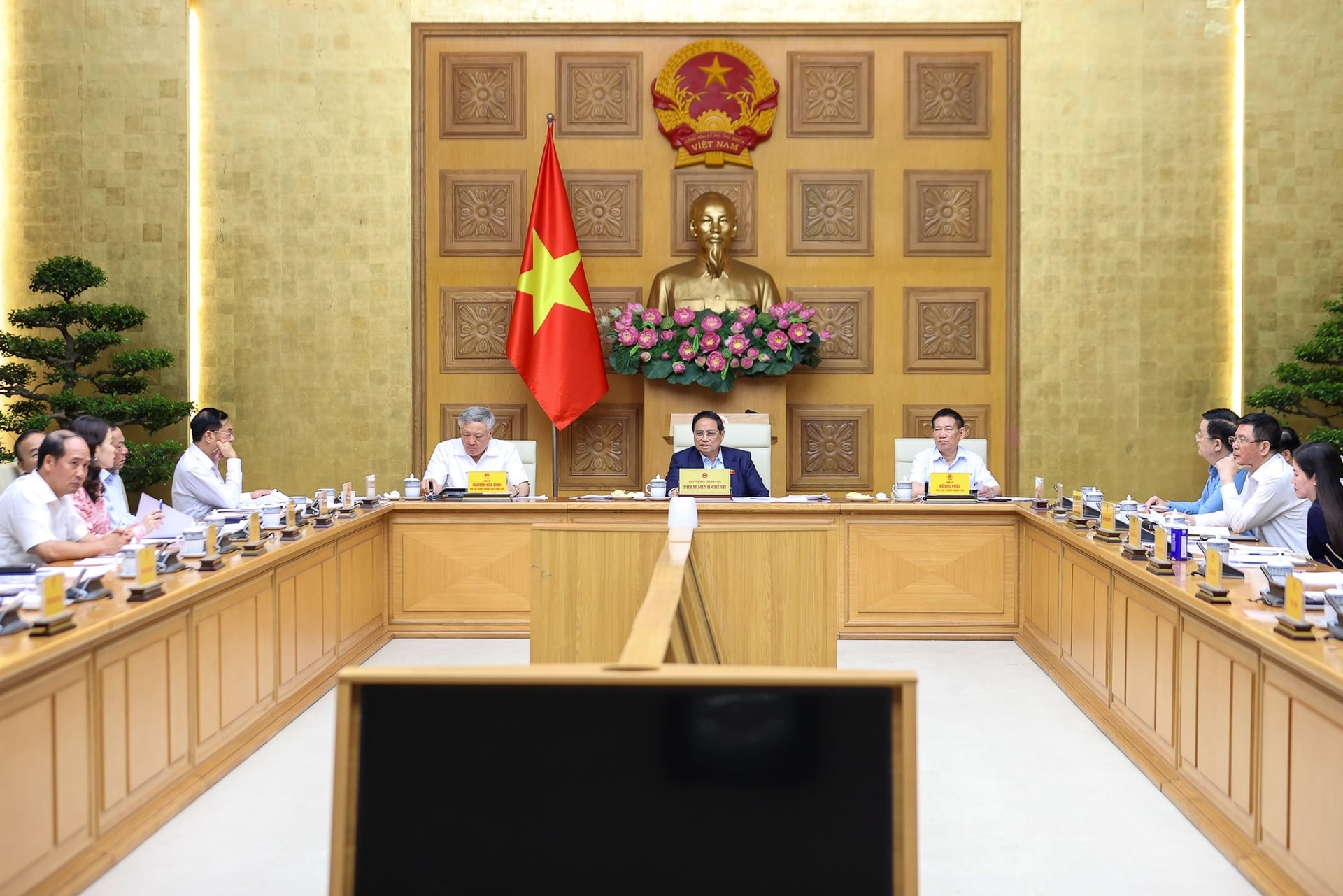
Prime Minister Pham Minh Chinh chairs the meeting with the government’s regular members on June 23rd. Photo: VGP
Regarding monetary policy, the Prime Minister emphasized the necessity of careful monitoring and flexible management, focusing on inflation control and exchange rate stability. He also drew attention to interest rates in the context of expanding production and business activities, ensuring easier access to capital, and encouraging banks to provide more support to businesses and the economy as a whole.
The Prime Minister instructed that interest rates should be managed appropriately, balancing the goals of aiding production and business while supporting growth. He advocated for controlled credit expansion, prioritizing production sectors, especially deep processing, agriculture, and exports, with a particular emphasis on providing credit support to farmers. Additionally, he called for vigilance against opportunistic behaviors, such as gold and foreign currency speculation.
Furthermore, the Prime Minister assigned the Ministry of Industry and Trade and the Ministry of Agriculture and Rural Development, along with relevant agencies, to collaborate in effectively managing the market. He underscored the critical role of agriculture as a pillar in any circumstance, emphasizing the need to ensure sufficient food production for domestic consumption and exports, thereby contributing to global food security.
The Prime Minister instructed the Ministry of Industry and Trade to monitor the market situation and prices, ensuring the supply of essential commodities, particularly energy, electricity, and gasoline. Meanwhile, the Ministry of Science and Technology was tasked with ensuring stable telecommunications services.
Concerning direct and indirect investment and exports, the Prime Minister emphasized the importance of maintaining and further improving the business investment environment to attract investment. He instructed the Ministry of Industry and Trade to continue exploring market and supply chain diversification, expanding markets, accelerating negotiations for new FTAs, and maximizing the benefits of existing FTAs.
Additionally, the Ministry was directed to enhance trade promotion, develop logistics, streamline customs procedures, support businesses in reducing transportation and input costs, stimulate domestic market consumption, and strengthen efforts against smuggling and counterfeit goods, especially in the realm of e-commerce.
“A Call to Action: Prime Minister Directs Three Major Conglomerates to Ensure Energy Security Amid Middle East Tensions”
“This is regarded as a flexible, timely, and effective solution to the evolving conflict situation in the Middle East.”
“A Nimble Monetary Policy: Steering a Steady Course for Macroeconomic Stability”
Good morning, esteemed members of the National Assembly. I stand before you today as the Governor of the State Bank of Vietnam, Nguyen Thi Hong, to address key issues pertaining to macroeconomic policy management, enhancing the role of the banking sector in economic growth, and the 2% interest rate support policy. As we gather at this pivotal 9th session of the 15th National Assembly, it is imperative that we delve into these matters with utmost diligence and foresight.
“Vietsovpetro Seeks to Invest Over $530 Million to Develop 53 New Wells in Vietnam’s Largest Oil Field”
The Bach Ho (White Tiger) oil field is renowned for being Vietnam’s largest oil field and one of the world’s most extraordinary reservoirs. With an impressive in-place volume of over 500 million tons of oil and gas, it stands as a testament to the country’s vast energy potential.


























